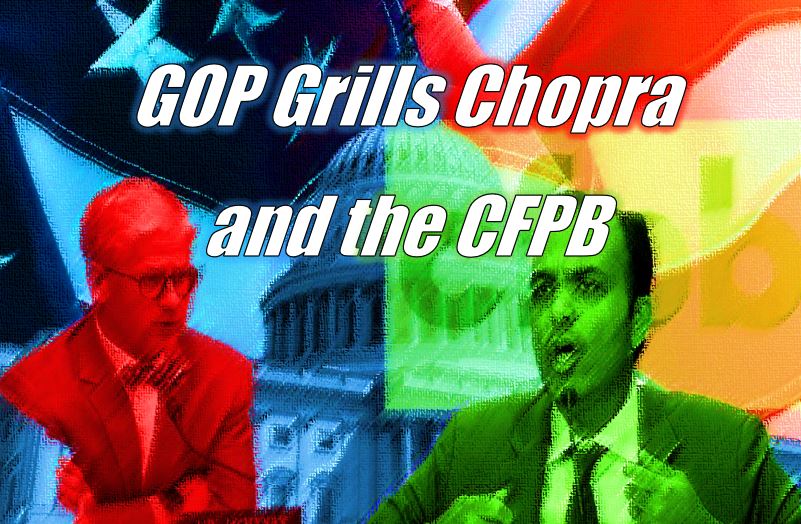
“I’ll start by stating the obvious: the lack of transparency with your agency is appalling” – Incoming HFSC Chair, McHenry
In a preview of what is to come next year, things got testy last week at the Congressional House Financial Services Committee (HFSC) as they reviewed last year’s actions of the Consumer Financial Protection Bureau under Director Rohit Chopra. Incoming HFSC Chair McHenry made clear his displeasure with CFPB Director Chopra’s leadership as he questioned the integrity of their approach to rule making and guidance.
The CFPB was already under threat by the 5th Circuit Court of Appeals ruling that their funding structure has been ruled as unconstitutional. Before this, things had been smooth sailing for the Rohit Chopra’s leadership of the CFPB under a Democrat controlled House. But elections have consequences.
And with an incoming Republican controlled Congress, he faces increased scrutiny. And no one showed greater contempt for his leadership than incoming Chair of the Congressional House Financial Services Committee (HFSC), North Carolina Congressman Patrick McHenry.
As previously reported, just a day before the hearing, the CFPB added a proposed rule to its list for 2022. This rule proposed the creation of a “Black List” required for certain nonbank covered entities, including debt collectors, to register with the bureau when they become subject to certain local, state, or federal consumer protection agency or court orders. As inflammatory as this proposal was, it never made the meeting agenda.
Waters had already issued a PDF memo for the hearing and intended to focus solely on the bureau’s actions since Chopra’s last meeting with the committee in April of 2022. Included was their rulemaking developments on mortgage refinances and forbearances, credit reporting, consumer complaints, credit card late fees, consumer complaints, COVID response, as well as several other topics, including budget.
Lack of Transparency
Ranking member, GOP North Carolina Congressman Patrick McHenry, chair elect for the committee the 118th Congress coming in 2023, remarked that under his leadership, there will be more oversight by the HFSC.
“We have a lot to cover today, but I’ll start by stating the obvious: the lack of transparency with your agency is appalling,” McHenry stated. “Over the past year, committee Republicans sent you more than 10 letters, many with specific questions we want answered, to which you replied with single-page responses This prevents Congress from conducting proper oversight. It’s not good for financial institutions, and other market participants, nor the consumers they’re trying to serve.”
Partisan Views
While members from both sides of the aisle stayed focused on the bureau’s approach to rulemaking and guidance, views on the bureau’s increase in guidance documents, interpretive rules and advisory opinions under Chopra’s leadership were clearly drawn on party lines. Question arose as to if they follow the Administrative Procedure Act, plus language in press releases issued on those documents.
Committee Chair Waters opened with a flowery statement on the bureau and its current situation;
“Committee Democrats applaud the CFPB for once again putting all of our consumers first with these critical wins, and we remain committed to fighting against any and all efforts to thwart this progress. We are also closely monitoring the deeply flawed ruling from the Fifth Circuit that, while focused on the CFPB’s funding, would disrupt the entire federal government, harm the economy, and leave consumers with fewer protections than the predatory pre-financial crisis days. Democrats support the Justice Department’s and CFPB’s appeal to the Supreme Court to overturn this absurd ruling, and we stand ready to support the CFPB as much as we possibly can.”
Across the aisle, the tone was quite different.
“The bureau has shown a willingness to regulate and operate by any means other than those that are legally and ethically appropriate in contravention to the Administrative Procedure Act and rulemaking process,” said U.S. Rep. Blaine Luetkemeyer, R-Mo. “The courts have already begun to chip away at the bureau’s illegal framework and actions—it’s long past time that Congress does our part.”
Under the questioning of incoming Chair McHenry, Chopra explained the bureau’s guidance and interpretive rules are in response to industry feedback. Dissatisfied, with this response, McHenry sought clarity on how guidance relates to enforcement of laws.
“Enforcement is just one vehicle, but to promote compliance and clarity to also be able to provide more transparency on how we interpret rules … none of the guidance documents commit institutions to obligations under the law,” Chopra responded.
As expected, Democratic Representative from Colorado, Ed Perlmutter, threw a spoon-fed inquiry on the bureau’s enforcement actions versus guidance, literally answering the question in the question stating that their guidance can serve as a “heads up” for regulated entities on particular regulations.
Chopra said the bureau’s guidance is offering transparency that allows other firms to do a “gut check,” and the bureau is offering legal interpretations about existing rules.
“Where we are seeking to create new obligations, we go through the rulemaking process,” Chopra said.
But Rep. McHenry shot back;
“Under your leadership, the CFPB also brazenly circumvents the public comment process. In fact, you’ve put forth just one ‘real’ rule through notice and comment.” he complained. “Meanwhile, you have issued 6 compliance bulletins, 5 advisory opinions, 5 interpretive rules, and just this year, 7 circulars.”
“While not legally binding, such “clarifications” and “guidance” without time to process the changes foster an environment of uncertainty for the industry. Financial institutions and other market participants change their behavior, increasing compliance costs and ultimately limiting consumers’ access to affordable products and services.”
“You’re implementing progressive policies at the expense of both consumers seeking financial products and market participants trying to comply with the law. And you’re doing so without fully and transparently considering the consequences of your actions.”
A Questionable Budget
Of some concern to Committee members was the bureau’s fourth quarter budget request from the Federal Reserve. Being significantly higher, they were asked if the additional funds were being designated for additional rulemaking.
Republican Michigan Representative Bill Huizenga took issue with the bureau’s tendency to lead by enforcement rather than rule in stating; “The bureau seems to follow a pattern to not issue a rule, but enforcement actions, blog posts, opinion letters … as an alternative to the rulemaking process, which strikes me as strange given the recent budget request,”
Fellow Republican Representative Ralph Norman of South Carolina added that constituents are concerned about how the bureau is rewriting rules and running as a “one-man marching crew.”
He went on further questioning how the bureau has authority to pick certain kinds of debt, to determine that they not accurately reported. Chopra defended the bureau’s stance on credit reporting by saying that the bureau does not want credit reports to be used as a tool of “extortion.”
“Where we have focused on medical debt is really credit reporting and we see inaccuracies,” Chopra said.
On to the Supreme Court
last October, the 5th Circuit Court of Appeals ruled in the case of Community Financial Services Association of America Ltd. v. CFPB that the CFPB’s funding through the Federal Reserve rather than congressional appropriations violates the U.S. Constitution’s separation of powers.
This dramatic statement and ruling put the very structure of the CFPB under question as well as all past and future rulings made by them.
The CFPB almost immediately filed a petition for certiorari (expedited review) with the U.S. Supreme Court to review the decision. This spurred some debate between Chopra and Republican Representative Andy Barr of Kentucky.
“The bureau’s argument not only misreads Supreme Court testament, but also the plain text of the appropriations clause,” said Barr inquiring of Chopra’s stance as to whether or not the bureau’s funding is subject to congressional appropriations. Chopra advised that it is addressed in the addressed in the petition to the Supreme Court.
“We believe the 5th Circuit is not correct,” Chopra said.
Barr is proposing the Taking Account of Bureaucrats’ Spending (TABS) Act, which would bring the bureau’s funding into the congressional appropriations process.
To date, the Supreme Court has not responded to the bureau’s petition. While the bureau requested that the Supreme Court to review the case during its current term, the term is quickly running out.
To perhaps set the stage for what is to come in 2023, Rep. McHenry stated; “the real problem here, and what we’ve been saying from the moment of your agency’s inception, is this: Why would the next director, with a different political persuasion, not abuse his or her powers with the precedent you’ve set?
“The political pendulum doesn’t stop swinging. Next month there will be a new majority in the House of Representatives.”
“I think you’ll wish you tried harder to play by the rules.
Where all of this goes is anyone’s guess, but with an incoming Republican controlled House Financial Services Committee coming into office in a month, expect to see more resistance to this long disputed independent branch of regulators.
Incoming GOP House Financial Services Committee Chair Grills CFPB’s Chopra – Consumer Financial Protection Bureau – CFPB
Incoming GOP House Financial Services Committee Chair Grills CFPB’s Chopra – Consumer Financial Protection Bureau – CFPB










Facebook Comments